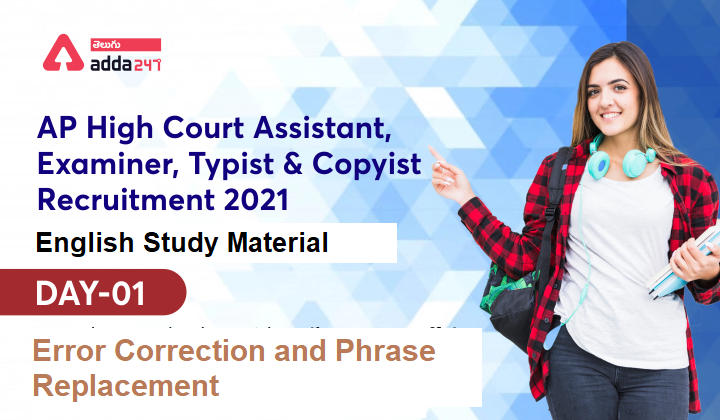AP High Court Assistant పరీక్షలో ఇంగ్లీష్ విభాగం ఉన్నది. ఈ విభాగంలో reading comprehension, sentence formation, synonyms & antonyms, grammatical errors మొదలైన వాటి ఆధారంగా ప్రశ్నలు ఉంటాయి. అన్ని పోటీ పరీక్షల మాదిరిగానే AP హైకోర్ట్ పరీక్ష నందు Error Correction చాల ముఖ్యమైన అంశము. కావున ఇక్కడ ఇంగ్లీష్ విభాగంలో అతి ముఖ్యమైన అంశాలకు సంబంధించిన సమాచారం ఈ వ్యాసంలో మీకు అందిస్తున్నాము. Error Correction అంశానికి సంబంధించి AP High Court Assistant English Study Material రూపంలో మీకు పూర్తి సమాచారం అందిస్తున్నాము.
The Error correction questions are generally related to parts of speech, singular plurals, infinitives, participles, tenses, use of articles etc. To rectify the errors in the sentence, candidates need to aware of basic grammar skills. In this articles, we are providing you some common types of errors and tips to solve the error correction questions.
HOW TO SOLVE ERROR CORRECTION QUESTIONS:
Error Spotting Question Type – 1
The first kind of error in the error spotting questions is about determining whether singular or plural verb is to be used in a sentence. To better understand the same, consider the example –
1. [a] Many students is/ [b] competing for/ [c] IITs and IIMs / [d] no error. Spot the error in the sentence.
[a]
[b]
[c]
[d]
While this is an easy question, the answer, in this case, would be the option [a]. Many students is’ would become ‘many students are’. So, in the first case, the singular is changed to the plural verb.
Error Spotting Question Type – 2
The second kind of error spotting question involves the case of fillers before the infinite verbs. For reference, an infinite verb refers to anything that comes after ‘to’, such as ‘to play’, ‘to sing’, ‘to read’, etc. Consider this example to better understand the kind of question you may be asked in this case-
2. [a] Do you know / [b] to sing / [c] a song/ [d] no error. Spot the error in the sentence.
[a]
[b]
[c]
[d]
In this case, as you might have had guessed, the answer is the option [b]. The infinite verb, ‘to sing’ is incomplete without ‘how’ and hence it is the correct answer.
Error Spotting Question Type – 3
The third and last kind of error spotting question is generally harder than the first two and they involve the tenses of verbs. In other words, in this kind of question, you need to spot the error which has to do with the correct tense of the verb. The tenses error spotting questions are common and hard not because the concept is hard to grasp, but because they can be asked in so many ways. Hence, this kind of question requires more practice. Consider this example –
3. [a] The governor was efficient / [b] and ensure that the king was happy / [c] as well as his subjects / [d] no error.
[a]
[b]
[c]
[d]
This is the simplest kind of questions that one could expect from the tenses in the error spotting topic, but it does give a clear picture or idea of the case. In this case, the second option would be [b] and ensured that the king was happy as the event had occurred in the past (as could be determined by the first part of the sentence).
Therefore, it is necessary to know all three types of error spotting questions to best prepare oneself to answer all of them in the exam in an efficient manner.
మీరు AP High Court Assistant పరీక్ష కొరకు సిద్దమవుతున్నారా??
Tips & Tricks for Spotting Errors in English:
Even those students who are well – versed with English end up making the silliest of errors in grammar. It is a very natural tendency but error-spotting is not an art that one can’t master. It is just a matter of swearing by some guidelines and practice! Here are 26 tips for error spotting in English:
1. Certain nouns possess a singular form but still represent plurality and thus, take a plural verb when used in a sentence.
E.g. Cattle, peasantry, people, clergy, police.
Thus,
The Police has come (Incorrect)
The Police have come (Correct)
2. Certain nouns always take the plural verb because their form is always plural.
E.g. Scissors, trousers, spectacles, thanks, premises.
Thus,
The scissors is kept on the table. (Incorrect)
The scissors are kept on the table. (Correct)
3. When a number is followed by a noun denoting measure, length, money, number or weight, the form of the nouns does not change so long as they are followed by another noun or pronoun.
E.g. Million, pair, metre, year, dozen, foot, head.
Thus,
This is a nine – metres cloth. (Incorrect)
This is a nine – metre cloth. (Correct)
4. When a number is followed by a noun denoting measure, length, money, number or weight, but these are not followed by another noun or pronoun, then they take the plural form.
E.g. Million, pair, metre, year, dozen, foot, head.
Thus,
This sari is nine yard long. (Incorrect)
This sari is nine yards long. (Correct)
5. Certain nouns, especially of the collective category, are used as singular when they specify a unit.
E.g. Public, team, committee, government, audience, orchestra, company, jury.
Thus,
The public were unanimous in their opinion. (Incorrect)
The public was unanimous in its opinion. (Correct)
6. Certain nouns, especially of the collective category, are used in plural when they specify a difference of opinion or class.
E.g. Public, team, committee, government, audience, orchestra, company, jury.
Thus,
The jury was divided in its opinion. (Incorrect)
The jury were divided in their opinion. (Correct)
7. If the pronoun ‘one’ is used, it must be maintained throughout the sentence.
Thus,
One must respect his elders. (Incorrect)
One must respect one’s elders. (Correct)
8. The word ‘whose’ is used for living people and ‘which is used for non-living things or ideas.
Thus,
Which box is kept on the table? (Incorrect)
Whose box is kept on the table? (Correct)
9. ‘Less’ is used to denote quantity while ‘fewer’ is used to denote number.
Thus,
No less than twenty people were (Incorrect)
No fewer than twenty people were (Correct)
Also Read : AP High Court Assistant Exam Pattern
10. ‘One of’ is always followed by noun in the plural form.
Thus,
She is one of the least important person in the office. (Incorrect)
She is one of the least important people in the office. (Correct)
11. Only ‘than’ should be used after ‘no other’ .
Thus,
I like no other movie but Titanic. (Incorrect)
I like no other movie than Titanic. (Correct)
12. After the word ‘Know’, ‘how, ‘what’ or ‘when’ should be used before using the infinitive.
Thus,
I know to speak English. (Incorrect)
I know how to speak English. (Correct)
13. If the verb indicates a purpose, an infinitive must be used and if the verb indicates a cause, a gerund must be used.
Thus,
He went to the mall for watching a movie. (Incorrect)
He went to the mall to watch a movie. (Correct)
He was suspended to show indiscipline. (Incorrect)
He was suspended for showing indiscipline. (Correct)
14. ‘As’ is not used with verbs like ‘appointed’, ‘elected’, ‘considered’,’called’ but it is used with the word ‘regard’.
Thus,
He was elected as Secretary of the organisation. (Incorrect)
He was elected Secretary of the organisation. (Correct)
I regard Sahil my best friend. (Incorrect)
I regard Sahil as my best friend. (Correct)
15. Adverbs should not be confused with adjectives. An adjective describes the characteristic of the subject while an adverb describes the action of the verb.
Thus,
The horse looked beautifully. (Incorrect)
The horse looked beautiful. (Correct)
16. Question tags are always the opposite of the sentence which means that if the sentence is positive, the question tag is negative and vice versa.
Thus,
You were dancing, were you? (Incorrect)
You were dancing, weren’t you? (Correct)
17. An infinitive verb should never be split.
Thus,
I request you to kindly tell me. (Incorrect)
I request you kindly to tell me. (Correct)
18. A pronoun after ‘like’, ‘unlike’ and ‘let’ takes an objective case.
Thus,
You will never find a woman like she. (Incorrect)
You will never find a woman like her. (Correct)
Let I do it. (Incorrect)
Let me do it. (Correct)
19. The relative pronoun ‘that’ is used instead of ‘who’ or ‘which’ after adjectives in the superlative degree.
Thus,
This is the best which she could do. (Incorrect)
This is the best that she could do. (Correct)
20. To show equality ‘as’ is used both before and after the adjective.
Thus,
I can run as fast, if not faster than you. (Incorrect)
I can run as fast as, if not faster than you. (Correct)
21. Even though more than one’ indicates a plural sense, it agrees with a singular noun and takes a singular verb.
Thus,
More than one students completed their project. (Incorrect)
More than one student completed his project. (Correct)
22. ‘Scarcely’ and ‘hardly’ are followed by ‘when’ and not by ‘than’.
Thus,
Hardly had the teacher left the room than the pupils started enjoying. (Incorrect)
Hardly had the teacher left the room when the pupils started enjoying. (Correct)
23. ‘Though’ is followed by ‘yet’ and not by ‘but’.
Thus,
Though he is poor but he is honest. (Incorrect)
Though he is poor, yet he is honest. (Correct)
24. ‘Lest’ must be followed by ‘should’ or by nothing at all and ‘Such’ must be followed by ‘as’.
Thus,
Work hard lest you will fail. (Incorrect)
Work hard lest you should fail. (Correct)
Work hard lest you fail. (Correct)
He is such a writer that everybody should read his books. (Incorrect)
He is such a writer as everybody should read his books. (Correct)
25. ‘Unless’ expresses a condition and is always used in the negative sense. Thus ‘not’ is never used with ‘unless’.
Thus,
Unless you do not work hard, you will not excel in the examination (Incorrect)
Unless you work hard, you will not excel in the examination. (Correct)
26. ‘When’ denotes a general sense and ‘while’ implies a time duration of doing something.
Thus,
When learning how to sing, technique is of utmost importance. (Incorrect)
While learning how to sing, technique is of utmost importance. (Correct)
Q1. Cattles were grazing (1)/ in the meadows (2)/ near our farm (3)./ No error (4)
(a) 1
(b) 2
(c) 3
(d) 4
Q2. Many a man (1)/ have been (2)/ working under me (3)./ No error (4)
(a) 1
(b) 2
(c) 3
(d) 4
S1.Ans. (a)
Sol. Change, Cattles → Cattle.
‘Cattle’ are one of those collective nouns which though singular in form are always used as plurals.
S2.Ans. (b)
Sol. Change, HAVE → HAS,
Verb → Singular form.
‘Many a’ is always followed by a singular noun and singular verb.
Check Now : AP High Court Assistant Syllabus
Also Download:





